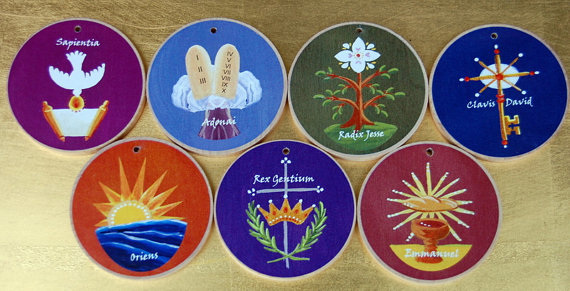Gaudete! Rejoice! This day is called Gaudete Sunday because of the first word of our entrance antiphon from Philippians 4 which comes from the Latin root gaudium meaning “joy.” Our Advent is half over and in her wisdom, Mother Church calls us to rejoice because the Lord is near. Today marks a break in the penitential practices we have undertaken this Advent symbolizing that joy and gladness should never be absent from our hearts. Liturgically, sacred vestments are rose and we light the rose candle on our Advent wreath. Flowers are permitted on the altar and musical instrumentation is more ornate. In all three years of the Sunday cycle, all of the readings speak of joy. The responsorial psalms in each of the years speak of God’s unending mercy, his favor on the poor and lowly, and praise him for his boundless goodness. This year, our psalm is taken from chapter 12 of Isaiah which is titled “Song [Canticle] of Thanksgiving.” For its context, we have to look back at chapter 11 in which Isaiah prophesies the rise of a new Davidic king who will fulfill all the promises make to Israel. Under the new king universal peace and justice will reign, even among wild animals (“The wolf shall be guest of the lamb, and the leopard shall lie down with the young goat; … The baby shall play by the viper’s den, and the child lay his hand on the adder’s lair” Isaiah 11:6ab, 8). In the name of Israel, Isaiah praises the Lord for that longed-for day. This prophecy is fulfilled in Jesus and so we rejoice! As a side note, this canticle is used only three other times in the three year cycle and all celebrating major events: the Baptism of the Lord in Year B, each year at the Easter Vigil, and the Sacred Heart of Jesus in Year B.
This Friday December 17, Advent shifts focus from the Second Coming of Christ at the end of time to his First Coming in Bethlehem. On the 17th through the 23rd, the Church sings or recites the ancient O Antiphons before  and after the Magnificat (Mary’s Canticle in Luke 1:46-55) at Vespers each evening. The O Antiphons are also used as the Alleluia Verse at Mass on each of these days. The song “O Come, O Come, Emmanuel” is based upon these antiphons. There is evidence that these ancient antiphons were around as early as the fifth century. They were recited by the abbot and other abbey leaders in descending rank at the Benedictine Abbey of Fleury (now Saint-Benoît-sur-Loire) in France. By the eighth century they had spread to Rome and then throughout the Church. Each antiphon, drawn from the Prophet Isaiah, has a two-fold purpose: it states a Scriptural title for the Messiah and then refers to the prophecies of his coming.
and after the Magnificat (Mary’s Canticle in Luke 1:46-55) at Vespers each evening. The O Antiphons are also used as the Alleluia Verse at Mass on each of these days. The song “O Come, O Come, Emmanuel” is based upon these antiphons. There is evidence that these ancient antiphons were around as early as the fifth century. They were recited by the abbot and other abbey leaders in descending rank at the Benedictine Abbey of Fleury (now Saint-Benoît-sur-Loire) in France. By the eighth century they had spread to Rome and then throughout the Church. Each antiphon, drawn from the Prophet Isaiah, has a two-fold purpose: it states a Scriptural title for the Messiah and then refers to the prophecies of his coming.
17th: O Sapientia (O Wisdom) 18th: O Adonai (O Lord) 19th: O Radix Jesse (O Root of Jesse)
20th: O Clavis David (O Key of David) 21st: O Oriens (O Rising Sun)
22nd: O Rex Gentium (O King of the Nations) 23rd: O Emmanuel (O God-with-us)
The ordering of the titles is very intentional. Taking the first letter of each Latin title and placing them in reverse order, it forms the acrostic ero cras which means, “Tomorrow, I will come.” In monasteries, there was a custom that different monks would provide special treats to the members of his community on the day he recited the antiphon. Maybe this is a tradition to revive in our families! Each member could take a day, recite the antiphon (you can find them on the USCCB website), and provide some treat to the rest of the family. The extra joy overflowing from this simple act of giving would make Christmas even more special. May you have a blessed final two weeks of Advent!


Comments
There are no comments yet - be the first one to comment: